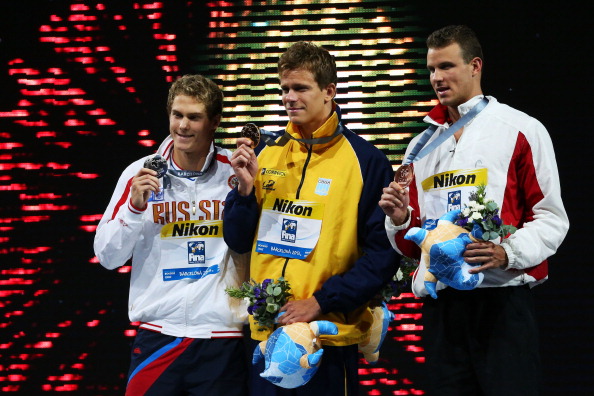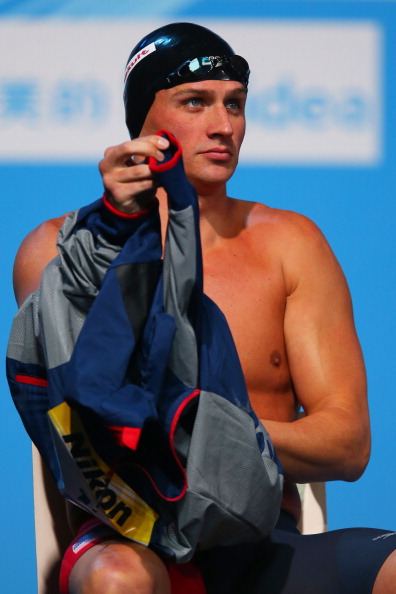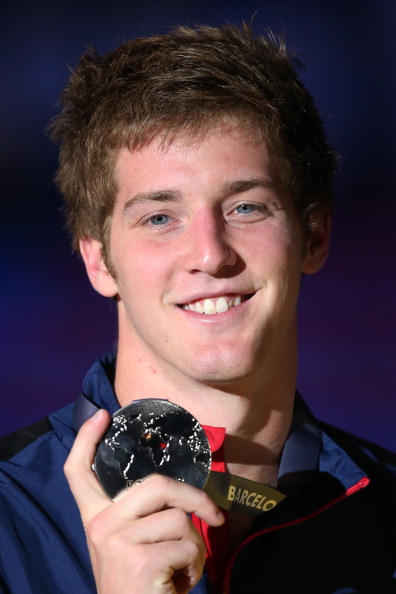MOSCOW -- Over the past few weeks, Russia's controversial anti-gay law has suddenly become a driving narrative in the lead-up to the Sochi 2014 Winter Olympics. At issue is both the power of the Games to focus attention on social change as well as the very real limits of the Olympic movement to drive such reform. Nick Symmonds, the U.S. 800-meter runner, here for the track and field world championships, put it beautifully in his blog for Runner's World magazine.
He "disagreed" with the controversial new law, which outlaws the promotion of homosexuality to minors or holding gay pride rallies, saying our "LGBT (lesbian, gay, bisexual and transgender) neighbors deserve all the same rights as the rest of us. However, as an American who is about to reside in Moscow for 12 days, this will be the last time I will mention this subject.
"I say this not out of fear of prosecution by the Russian government, but out of respect for the fact that I will be a guest in the host nation. Just as I would not accept a dinner invite to a friend's house and then lecture them on how to raise their kids, neither will I lecture the Russian government on how to govern their people.
"If I am placed in a race with a Russian athlete, I will shake his hand, thank him for his country's generous hospitality, and then, after kicking his ass in the race, silently dedicate the win to my gay and lesbian friends back home. Upon my return, I will then continue to fight for their rights in my beloved democratic union."
One of the wonders of the Games is that it can open up a country in ways that take time -- years -- to appreciate. Consider Seoul in 1988, and South Korea now. The city and country are very different, and the Games were a catalyst. Barcelona 1992 -- the same.
We don't know what having the Games in Beijing will mean in and to China -- the impact of having had thousands of foreign visitors there, mingling -- by 2018 or 2028.
In the same vein, it's now six months before the 2014 Winter Olympics. In no way can we judge what having the Olympics in Sochi in 2014 will mean in and to Russia by, say, 2024 or 2034.
This is a country that, as Sochi 2014 leaders consistently point out, hadn't seen a recycling program for its water bottles and didn't have a culture of volunteering before it won the Winter Olympics.
As Johnny Weir, the gay U.S. figure skater, observed in his latest blog post, "The Olympics will be 14 days of direct reporting, from the source, and shedding light not only on the best athletes in the world, but also the many ways in which we can help our fellow man in a repressive nation."
That's why calls for a boycott -- which, aside from the obvious, that boycotts only hurt athletes -- are so stupidly wrong.
In his open letter to British Prime Minister David Cameron and International Olympic Committee President Jacques Rogge, the British activist Stephen Fry said an "absolute ban" on Sochi 2014 is "simply essential." The letter, delivered this week to the IOC, also compared the "barbaric, fascist law" to the persecution of Jews in Nazi Germany and said of Russian president Vladimir Putin, "At all costs, Putin can not be seen to have the approval of the civilized world."
For one, barring something unforeseen and extraordinary, the Games are not going to be moved. There are six months to go. A Winter Olympics is not a middle-school ski meet that you just pick up and move on short notice to, say, Vancouver. There's sound reason the IOC awards it seven years out.
For another, this is not 1936. The parallel between Russia now and Germany then simply does not hold, and further does a disservice to the memory of the 6 million Jews and others who were slaughtered without mercy in the Nazi death camps.
For sure, rhetoric such as Fry's has its purpose. The open letter was said to have been delivered with more than 300,000 signatures. Experience reveals the IOC is often ultimately unmoved by such displays. In 2008, the Olympics were, in fact, held in China amid great pre-Games controversy over Tibet.
Moreover, isn't it perhaps a bit presumptuous for Fry to assert that Russia is not part of the "civilized world"? The country that boasts of -- just to name one of any of a number of great institutions -- the Bolshoi Ballet? That gave the world the literature of, among others, Anton Chekhov and Leo Tolstoy? One of the world's superb art museums, the Hermitage in St. Petersburg?
The IOC, its senior vice president, Singapore's Ser Miang Ng, said earlier this week, was engaged in "quiet diplomacy" with the "highest authority" in Russia.
In that context, the IOC is obviously trying to buy time. Rogge said Friday at the briefest of news conferences -- 10 minutes, six questions in all -- the IOC was still trying to translate the law itself from Russian to English to understand it fully. Of course, why the IOC didn't already have a copy of the law in hand, translated, is confounding. Email went down? Fax machines didn't work?
President Obama said this week he had "no patience" with the Russians over the issue. With profound respect for the president, who has issues with Russia over Syria, the former intelligence contractor Edward Snowden and other matters, he also said, "Every judgment should be made on the track, or in the swimming pool, or on the balance beam, and people's sexual orientation shouldn't have anything to do with it."
The last part -- dead-on right.
The rest -- it's the Winter Olympics, not the Summer, and of course here some IOC members would be inclined to take note of Mr. Obama's off-point remarks and again call up, say, the U.S. presidential security detail tying things up before the 2009 vote in Copenhagen at which Chicago got whacked in the first round, Rio winning the 2016 Summer Games.
The Russians have already spent north of $50 billion on the Sochi project. They have a lot at stake in making it work.
So, too, the IOC.
The IOC should -- as it assuredly is doing in its "quiet diplomacy" -- oppose in the strongest possible terms any move that would jeopardize the principle, laid out in the Olympic charter, that the Games should be open to all, free of discrimination.
To be sure, the IOC will have in turn received from the Russians -- again, at the highest levels -- assurance that the legislation will not affect those attending or taking part in the Games. That is the way this works, Russian sports minister Vitaly Mutko urging critics Thursday at a news conference to "calm down."
Referring to criticism, Mutko was quoted Friday as saying by Interfax, according to an Associated Press report: "I wouldn't call the pressure light. Russia must understand that the stronger we are, the more other people aren't going to like it. We have a unique country."
"We don't have to be afraid of threats to boycott the Olympic Games. All sensible people understand that sports demand independence, that it is inadmissible that politics intervene."
All the same, the expectation of what is -- and is not -- possible must come through clearly:
The IOC is not a government. It is not even quasi-governmental. Its role is to inspire the best in human beings around the world -- to promote friendship, excellence and, yes, respect.
That does not mean, however, that we are all going to agree. Or that we should. Or that the way we do it this year in the United States, or the west, is the way it should be done everywhere.
Diversity means, you know, "diverse."
For instance:
A number of the states in the United States consider the death penalty sound public policy.
Weigh the following: a new law that allows Russian authorities to impose fines for providing information to minors about the gay community against American state-sanctioned execution.
The United States is seriously considering a bid for the 2024 Summer Games. Would Americans welcome a petition campaign by Russians, western Europeans, or for that matter, anyone anywhere demanding the state of Texas, for example, change its capital murder policy -- or else deny any U.S. city the right to stage the Games?
Back to Symmonds, who went out in the 800 semifinals in Beijing, finished fifth in London and who is considered a strong medal contender here this week, the world championships getting underway Saturday:
"I will say now what I said before the 2008 Olympic Games in Beijing, China, when people asked me how I felt competing in a foreign country with questionable human rights standards: The playing field is not a place for politics. In a world rife with never-ending political battles, let the playing field be where we set aside our differences and compete for national pride and the love of sport."
As Nick Symmonds would be the first to tell you, that can't happen unless everybody who is invited shows up. The Winter Games start in Sochi on Feb. 7. You know how pin-trading at the Games is a big deal? Here's guessing the rainbow pin will be much in demand.













